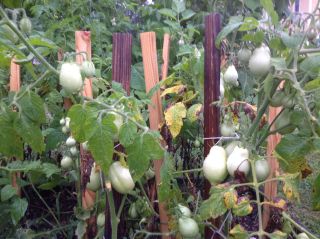Relationships
Choose to Flourish, This Year and Always
Personal Perspective: We must tend our gardens to grow and thrive.
Posted January 11, 2023 Reviewed by Vanessa Lancaster

Just as the plants in our house or garden need our support to grow and flourish, we must decide and make the effort to flourish ourselves. It doesn’t happen simply by growing up and older. Psychologist Lynn Soots said:
"Flourishing is the product of the pursuit and engagement of an authentic life that brings inner joy and happiness through meeting goals, being connected with life passions, and relishing in accomplishments through the peaks and valleys of life."
Soots emphasized that flourishing is not a trait or a characteristic; it's a choice. She says flourishing is a process that requires action. It takes effort.
That’s why I’ve chosen to make “Flourish!” my mantra for 2023. I adopt a personal slogan each new year rather than make New Year’s resolutions. Instead of a quickly forgotten list of do’s, don’ts, and want-to’s, I boil down my aspirations and hopes for the year into a simple phrase or single word I can call upon, as needed, to keep myself on track. Last year it was “Embrace your life.” A couple of years ago, it was “Shine!”
So, flourish. What exactly does it mean? As a lifelong lover of green growing things, I often use images from nature and the garden to illustrate concepts that can seem abstract. In this case, botanical references are most apt because the word flourish is from the Latin word for flower, flōs. Think about how a plant, when flourishing, shoots out new stems, leaves, and, eventually, flowers or fruit. Something that is flourishing shows ample evidence of its health and success. So it is with people who are flourishing.
Flourishing is a favorite topic in the field of positive psychology. It goes beyond mere happiness or well-being and includes a range of factors that evidence positive psychological health. Martin Seligman, director of the Positive Psychology Center at the University of Pennsylvania, is the “founding father” of this concept of flourishing in the field of positive psychology. He developed a five-part PERMA model in his effort to articulate what flourishing means. The five factors he described in his book Flourish are positive emotions, engagement, relationships, meaning, and accomplishments.
The PERMA model conveys the idea that flourishing is a state that we create by tending to each of the five factors—just as we tend our plants and flowers. We begin to do this by attaching verbs to each of them: increase our positive emotions; engage with the world and our work; develop meaningful relationships; find meaning and purpose in our lives; and achieve our goals by applying our strengths and talents to turn them into accomplishments.
Psychologists typically agree that flourishing includes well-being, happiness, and life satisfaction. But it’s more than that. It also includes optimism, positive relationships, mastery, self-determination, resilience, personal growth, vitality, and self-esteem. Virtue and health also have been proposed to be components of flourishing. Financial stability and spiritual health may be part of it, too. However many sub-categories we may define, the bigger point is that flourishing is the opposite of languishing.
In my case, my choice to focus on flourishing this year represents the exact opposite of the sense that I was languishing only a few years ago. Living back where I started, in my old hometown, I was repeatedly confronted by the utter lack of opportunity for someone with my particular skills and talents. I struggled to eke out even a bare living in a town whose appearance reveals the depression and pessimism that keep its residents dreaming of escape—but rarely choosing to make that escape.
I felt completely out of place. Even my friends there didn't seem to know how to talk with me about things that interested me, leaving me feeling awfully lonely much of the time. Up to the point of returning there, my life had been lived in major cities with ample work opportunities, an active social life, and global travel. Returning to the town I had fled at age 17 when I left to become a first-generation college student made it clear how much I had changed and how much more I expected from my life.
It turned out that being back in Ye Olde Hometowne meant I was there when my mom most needed me, as her chronic medical conditions became acute, and she eventually required a live-in caregiver. I became that caregiver. It’s a serious understatement to say it was difficult and traumatizing.
After Mom died in October 2019, I knew I had to leave home for a second time in my life if I wanted once again to enjoy my life–and flourish. Not quite two years ago, I chose to leave. I made a huge leap of faith and moved to Atlanta, because I saw an opportunity for work and a more satisfying social life—and to be close to my two sisters, who were already living just outside the city.
I found a job that allows me to use my best writing skills to do meaningful work, and pays well, too. I love my apartment, especially its wood-burning fireplace and balcony. I’ve found unexpected fun and joy in my family relationships. And I have begun slowly to develop new friendships.
I decided this year that with these very positive pieces in place, it’s time for this Connecticut Yankee transplanted to the capital of the New South to flourish. Time to enjoy peace in every direction–especially inside.
I hope you, too, will choose, and take, action to flourish. You can start by drawing deeply and deliberately from the nourishment of your own roots, the richness of your life’s experiences, and the wisdom your struggles and suffering teach you.
Flourish!




